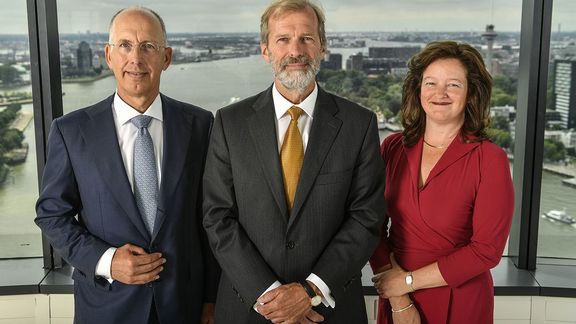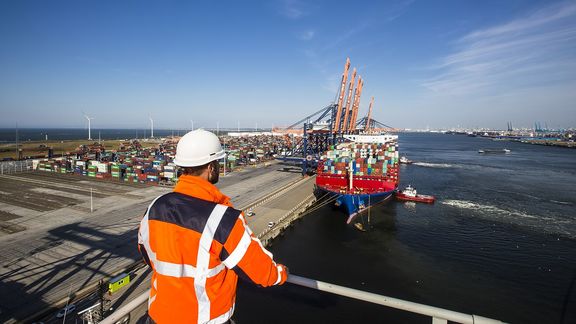Annual report 2019: Continuously working on the future
“The Rotterdam port and industrial complex has a strong position. The growth markets such as containers and distribution are developing positively and the new markets such as LNG and biofuels are expanding. The financial picture is upbeat as well. At the same time, we can see developments around the world, at the national level and within the port which mean that continued success in the long term cannot be taken for granted.
We are responding actively to those developments through our strategy and focusing on impact. In our changing world, one of our roles is to direct the port and industrial complex. Not only do we come up with initiatives, we also implement them in collaboration with clients and partners. As an independent party, we are eager to assume our responsibility for driving these processes, calling in external expertise and forging strong coalitions. The existing intensive collaboration between private companies, civil society, educational institutions and government makes Rotterdam an ideal place for innovations in areas such as the energy and digital transitions. We are grateful for this development, which boosts our confidence in a sustainable future for the Rotterdam port and industrial complex”.
Allard Castelein, the CEO of the Port of Rotterdam Authority, set out this assessment during his presentation of the 2019 annual report that was published online today.

From left to right: Ronald Paul, Allard Castelein and Vivienne de Leeuw
Largest port
With a total throughput of 469.4 million tonnes, we are the largest port in Europe by far. In 2019, we invested €338.3 million in, among other things, making the port more accessible, safer, more efficient and more sustainable.
Important developments
We are working with declining markets in the fossil industry and new business models that generate opportunities. Geopolitical developments also play an important role. In 2019, for example, we saw tensions between the leading trading blocs. There is also ongoing uncertainty about the introduction of trade tariffs post-Brexit. These developments are rendering the prospects for the further growth of world trade uncertain.
Our role in a changing world
In our changing world, one of our roles is to direct the port and industrial complex. That involves being active in the development of the client portfolio and initiating new activities. Not only do we come up with initiatives, we also implement them in collaboration with clients and partners. We believe it is important to establish an efficient energy and raw materials system so that existing activities have a future and so that new industry is located here. The arrival of Black Bear Carbon (for recycling car tyres) and uRecycle (for recycling batteries) are excellent examples of the second category. We would also like to mention the arrival of Innocent as the first major player in the Rotterdam Food Hub. The Port of Rotterdam Authority is investing on this 60-hectare new site in order to provide the optimal facilities for companies in the agro-food sector. The producer of smoothies and fruit juices started preparations in the autumn of 2019 for the construction of a carbon-neutral factory.
High level of investment
The investment portfolio is well filled at approximately €1.5 billion for the next five years. Some of this is finding its way to innovative projects in the energy transition and the digital transition in the logistics chain. Investments were high again in 2019. Of course, we look closely at innovation and costs. A good example is our approach to the construction and maintenance of maritime infrastructure. By using a total package of optimisation and design tools, we find innovative ways to save on investments. The use of less and/or smarter materials plays an important role here. An example is the protection of quay walls from corrosion using impressed current. The new insights can be used by both our clients and ourselves. We approach our clients proactively with opportunities for improving the performance of the maritime infrastructure. In addition, we work hard for our clients on enhancing the reliability of the logistics chain. For example, the first pile for the Container Exchange Route was driven in 2019, optimising the exchange of containers between the deep-sea terminals. The construction of the Theemsweg route, which involves rerouting a section of the port railway line, is on schedule.
Digital transformation
We also invested in the digital transition. As an independent party, we are eager to assume our responsibility for advancing the digital transition, calling in external expertise and forging strong coalitions. We continued to work on building a strong digital basis characterised by the integration of data management and services. Our products and services relate to shipping, commerce, port development and management, operations, logistics and accessibility. We follow two lines: improving our insight into the efficiency of logistical processes, and better management of the port infrastructure. An example of the latter is the development of a digital twin version of the port on an IoT platform. We have launched a pilot project in collaboration with ESRI, IBM and Cisco. The number of digital products that we develop, import and sell for the first line increased rapidly in 2019. Striking examples of products that have been developed further are Pronto and Navigate. The newcomers in 2019 included Boxinsider and OnTrack. Our initiatives in the digital transformation of the port and logistics allow us to enhance efficiency in the major trade routes, to cut costs and to reduce carbon emissions.

Focus is important
We are convinced that we are leading the way in the energy transition in the port and industrial complex. We can establish and maintain that position by implementing concrete projects on the basis of the ‘in-3-steps-sustainable’ approach. This also fits in with the National Climate Agreement of 2019 and the European Green Deal, which prioritise a cluster approach, the development of infrastructure and the combination of electrification and hydrogen. We are eager to collaborate with the national government on working up promising projects. In that respect, we note that the pace of planning, decision-making and realisation can and must be faster. In addition, we believe it is important for the introduction of the carbon levy to go hand in hand with the construction of the required physical infrastructure so that companies can reduce their carbon footprint. This is important for the business climate and the competitive position of the Netherlands. Porthos, for example, can make a useful contribution here. We made significant progress in 2019 with this project for capturing and storing CO2.
Together with partners
As well as providing direction, we also drive developments. We have been talking for some time about using residual heat from the port and industrial area. In close consultation with all the partners involved, the Ministry of Economic Affairs decided in 2019 that Gasunie would construct the heat pipeline through the centre of South Holland. We will be working together on the connection to the port and industrial complex. This decision allows us to make the most of the valuable residual flows from the Rotterdam port and industrial complex. Another important development in the energy transition is the connection of Heerema’s large offshore vessels to shore power. We are working on this area in close collaboration with Eneco, which supplies electricity through wind turbines in the immediate vicinity of the shore-based power location. Another important development: we are working with sixteen companies and organisations on the hydrogen economy in Rotterdam under the auspices of the H-vision project. This is a development that could allow us to reduce carbon emissions significantly in line with the target for 2030.
Confidence in the future
Last year, with our covenant partners, we presented the revised Port Vision. This vision acts as a compass: our ambitions are like dots on the horizon. Collaboration is crucial for the transformation of Rotterdam’s port and industrial complex. There is a willingness to invest, and institutes such as the Erasmus University, Delft University of Technology, SmartPort and the RDM campus ensure that knowledge standards are high. The existing intensive collaboration between private companies, civil society, educational institutions and government makes Rotterdam an ideal place for innovations in areas such as the energy and digital transitions. We are grateful for this development, which boosts our confidence in a sustainable future for the Rotterdam port and industrial complex. Our successes are based on our enterprising and effective organisation. The efforts of our workforce make that possible. Our thanks go out to everybody for their commitment. We also wish to thank our clients and other stakeholders – for whom we ultimately work – for their involvement, the trust they place in us and their cooperation. We are eager to maintain these sound relationships in 2020.